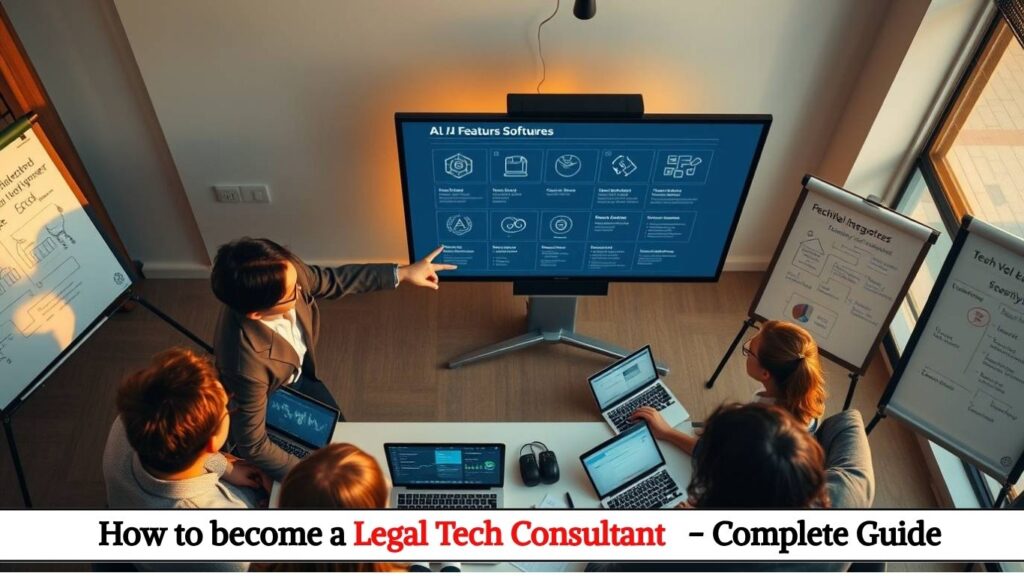
Introduction: The Future of Law is Digital
The legal industry is undergoing a $25.7 billion digital transformation (Statista 2024), creating unprecedented demand for legal tech consultants who bridge the gap between law and technology. These hybrid professionals help law firms and legal departments implement cutting-edge solutions, from AI contract review to blockchain smart contracts. With 85% of law firms now investing in legal tech (ABA TechReport), this career offers exciting opportunities at the intersection of law, business, and innovation.
This guide covers:
- 📜 The evolution of legal technology
- 💼 Key roles and responsibilities
- 💰 Global salary benchmarks
- 🎓 Essential qualifications and skills
- 🚀 Step-by-step career roadmap
- 🔮 Future trends shaping the industry
History of Legal Technology: From Typewriters to AI
The Analog Era (Pre-1990s)
- 1873: Remington develops the first legal typewriter
- 1960s: LexisNexis introduces computerized legal research
- 1979: WordPerfect becomes the first legal word processor
The Digital Revolution (1990s-2010s)
- 1994: First online legal services emerge
- 2006: Clio launches cloud-based practice management
- 2011: IBM Watson demonstrates AI legal research capabilities
The AI Transformation (2020s-Present)
- 2020: COVID-19 accelerates virtual legal tech adoption
- 2022: GPT-3 passes law school exams
- 2024: 30% of corporate legal departments use AI contract tools
- 2025: Projected $35B legal tech market (Gartner)
Roles & Responsibilities of Legal Tech Consultants
1. Technology Implementation
- Assess firm’s tech stack and workflows
- Recommend/document management systems
- Migrate legacy systems to cloud platforms
2. Process Automation
- Design RPA solutions for:
- Document assembly
- E-discovery workflows
- Billing automation
3. AI Integration
- Implement:
- Contract analysis tools (Kira, Evisort)
- Legal research assistants (Harvey, Casetext)
- Predictive analytics for litigation
4. Cybersecurity & Compliance
- Conduct data protection audits
- Implement legal-specific security protocols
- Ensure compliance with:
- Client confidentiality rules
- Data residency requirements
5. Training & Change Management
- Develop adoption roadmaps
- Conduct staff training programs
- Create continuous learning resources
6. Product Development
- Advise legal tech startups on:
- Market needs
- UI/UX for lawyers
- Ethical considerations
Legal Tech Consultant Salary Benchmarks (2024)
United States
| Position | Salary Range |
|---|---|
| Entry-Level Consultant | $75,000 – $100,000 |
| Senior Implementation Specialist | $120,000 – $160,000 |
| Legal Tech Product Manager | $150,000 – $220,000 |
| BigLaw Innovation Lead | $250,000+ |
United Kingdom/Europe
- Junior Legal Technologist: £45,000 – £65,000
- Legal Ops Consultant: £80,000 – £120,000
- EU Legal Tech Director: €130,000+
Asia/Australia
- Singapore Legal Tech Analyst: SGD 90,000-140,000
- Australian Legal Ops Manager: AUD 110,000-170,000
- India Legal Tech Consultant: ₹12-25 LPA
Essential Qualifications & Skills
Academic Pathways
- Undergraduate Degrees:
- Computer Science + Law (ideal combination)
- Information Systems
- Legal Studies
- Postgraduate Options:
- Master of Legal Technology (Melbourne, Bucerius)
- JD with Tech Law Concentration
- MBA with Legal Operations Focus
Key Certifications
| Certification | Focus Area | Issuer |
|---|---|---|
| CLP | Certified Legal Professional | ALA |
| CIPP | Privacy Compliance | IAPP |
| Lean Six Sigma | Process Improvement | IASSC |
| Relativity Certified | E-discovery | Relativity |
Technical Skills Inventory
- Legal software expertise (Clio, Litera)
- Programming basics (Python, SQL)
- Data visualization (Tableau, Power BI)
- Cloud platforms (AWS, Azure)
- AI prompt engineering
How to Become a Legal Tech Consultant: 5-Step Roadmap
Step 1: Build Dual Expertise
- Take courses in:
- Legal operations
- Legal project management
- Legal design thinking
- Develop hands-on experience with:
- Document automation (HotDocs)
- E-signature solutions (DocuSign)
Step 2: Gain Practical Experience
- Start in roles like:
- Legal operations assistant
- Law firm IT support
- Legal tech startup intern
- Contribute to:
- Legal hackathons
- Open legal tech projects
Step 3: Specialize & Certify
- Choose focus areas:
- Contract Lifecycle Management
- E-discovery & Litigation Tech
- Legal AI Implementation
- Obtain 2-3 key certifications
Step 4: Build Professional Network
- Join:
- International Legal Technology Association (ILTA)
- Corporate Legal Operations Consortium (CLOC)
- Local legal innovation hubs
- Attend:
- Legalweek
- CodeX FutureLaw
Step 5: Advance to Leadership
- Target positions like:
- Chief Legal Technology Officer
- Legal Innovation Partner
- Legal Tech Startup Founder
Future Scope: Emerging Legal Tech Frontiers
1. Generative AI Transformation
- AI legal assistants (case prediction, brief drafting)
- Ethical guidelines for legal AI use
- Bar exam implications
2. Blockchain Legal Applications
- Smart contract dispute resolution
- Tokenized legal assets
- Decentralized autonomous organizations (DAOs)
3. Computational Law
- Machine-readable regulations
- Automated compliance systems
- Predictive government policy modeling
4. Legal Metaverse
- Virtual law offices
- NFT-based legal documents
- VR courtrooms
5. Access to Justice Tech
- Chatbot legal aid
- Automated small claims systems
- Multilingual legal kiosks
Conclusion: Shaping the Future of Legal Practice
Legal tech consulting offers high growth potential (35% annual market expansion) with diverse career paths across law firms, corporations, and tech startups. As legal departments face 20-40% efficiency pressures (Thomson Reuters), your tech-law hybrid skills will be invaluable.
Launch your legal tech career by:
- Mastering both legal processes and tech solutions
- Building a portfolio of implementation projects
- Specializing in high-impact areas like AI integration
- Connecting with legal innovation communities
As Richard Susskind predicts: “The future of law is less about lawyers and more about technologists who understand law.” Will you be among those shaping this transformation?













Post Comment